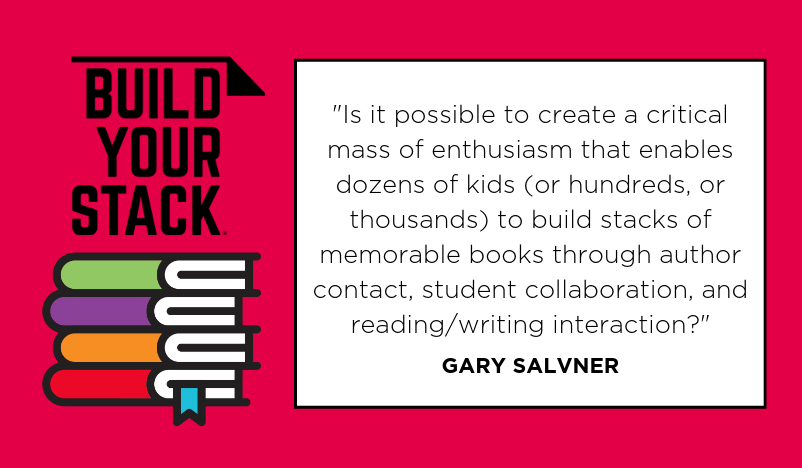This blog post is part of Build Your Stack,® a new initiative focused exclusively on helping teachers build their book knowledge and their classroom libraries. It was written by Gary Salvner.
Stack-building is all about matching individual kids with books that resonate, but the process can go beyond that.
What if we built an amazing book stack and then created an opportunity for readers to come together and celebrate their love of reading?
Is it possible to create a critical mass of enthusiasm that enables dozens of kids (or hundreds, or thousands) to build stacks of memorable books through author contact, student collaboration, and reading/writing interaction?
One model for such an approach is the Youngstown (OH) State University English Festival, a 41-year-old experiment in celebrating reading and writing that annually draws nearly 3,000 students, teachers, and librarians to a three-day event celebrating kids and books.
Here’s how it works:
Students in grades 7 to 12 read seven preselected YA titles before attending each year’s event. Then they come to the YSU campus to participate in a full day of activities that includes writing about books, discussing them in informal “insight” sessions, collaborating in fanciful writing games and other creative expression activities, hearing presentations by community experts regarding issues raised in the books, and listening to noted YA authors and experts who meet them in large-group talks, informal “press conference” journalism activities, and Q & A sessions.
About the book selection process:
A subcommittee reads titles all year and recommends about 20 to the entire committee to read over the summer. Then in the fall we have a lovely, lively, and very extended (yes, sometimes even heated) discussion that results in booklists for the two attending groups—7th to 9th graders and 10th to 12th graders. We take our job seriously in this review because kids deserve our serious attention. We look for quality, diversity (in both content and genre), and appeal in our selection, and we are sure to include titles by our visiting authors to prepare students for their presentations.
You can see our full book selection policy here.
If you’re curious about our full list of selected works over 40 Festival years, click here. It’s a catalog of much of the best in YA literature throughout its entire history as a genre.
So that’s how we stack-build for the festival, but might such a program contribute to stack-building for kids? Yes!
First, as students read those seven common books, they are setting up opportunities for rich conversation and interaction at the event—a cornerstone of the festival.
Preselected reading also heightens the chance students will encounter genres new to them: contemporary fiction, nonfiction, poetry, short story collections, historical fiction, fantasy, graphic novels, and dystopian literature.
Stacks are also built as interaction with other attendees generates further recommendation and conversation. In discussion sessions and signing lines, at bookstore tables and collaborative activities, students share their reactions to books:
“Have you read . . . ?”
“I love the characters in. . . . You do too? You should try. . . .”
“Have you heard . . . speak yet? Did you read the sequel to her/his. . . . ? You have to try it.”
Usually, English teachers ask these questions. At the English Festival, kids do.
English Festival students also write and respond in a variety of ways. They compete in essay contests that invite them to inquire about a character, setting, or theme. They collaborate in “what if” writing games that produce hilarious (but at the same time, perceptive) analysis. In advance of the festival they create original art based on the books, original “comic strip” graphic essays, and even original music based on stories or characters.
As they attend to their peers’ creative efforts in festival sessions built on, for example, the original art and music derived from books, they notice what writers and other readers are focused on in stories. They are adding to their “stack wisdom” about what can be valued in books.
If building stacks is the process of exhorting further reading, then any environment which invites enthusiasm, curiosity, and affirmation is a stack builder.
Yes, we should recommend specific books for specific readers whenever we can, and putting kids together to share books in a stimulating environment is also a stack-builder.
English Festivals don’t need to be massive three-day efforts that take a year to plan. They can be simpler school or classroom events centered on reading and response. If you’re curious about what we’ve tried, check our website or email us. Or come to visit!

Gary Salvner helped to create the YSU English Festival 41 years ago and still serves as its co-chair. A professor emeritus and former chair of English at Youngstown State University, he also has been active in ALAN for many years, serving as both its president and executive director. For his efforts on behalf of young adult literature, Salvner has been honored with both of ALAN’s major awards: the Hipple Service Award and the ALAN Award.

